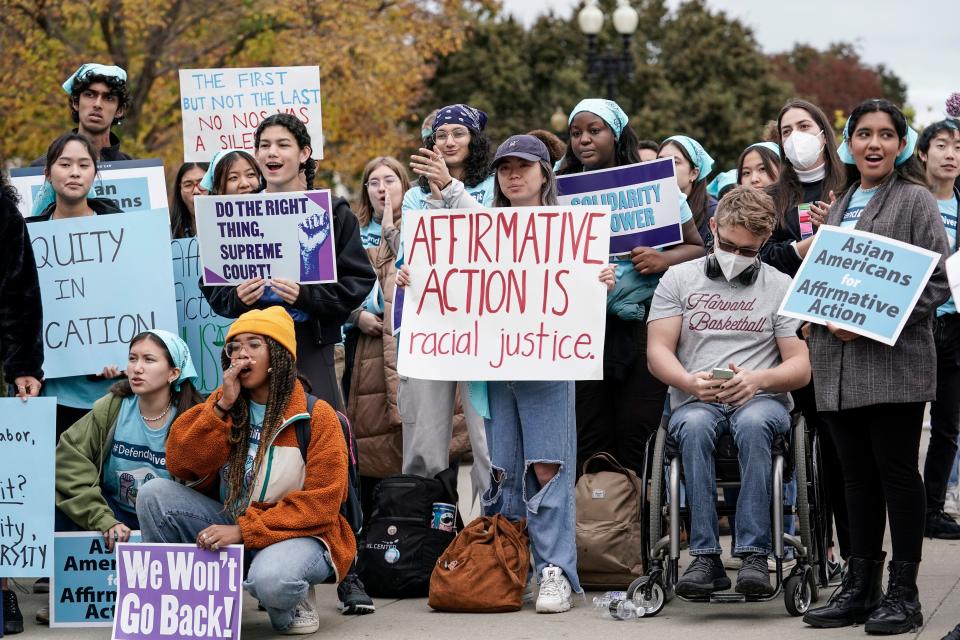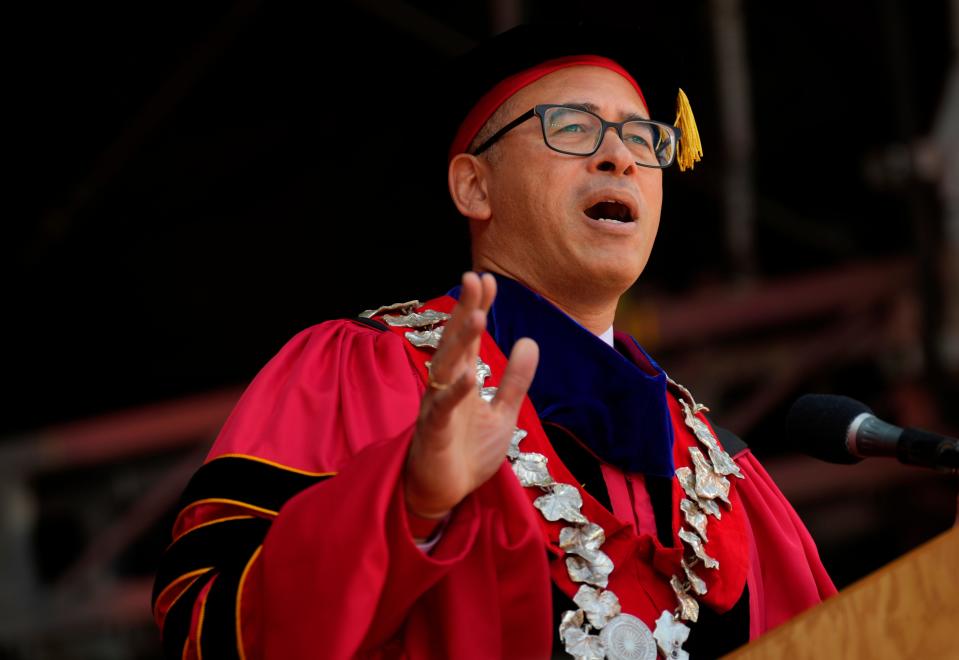Affirmative action ruling won't deter Rutgers, Princeton diversity pushes, officials say
- Oops!Something went wrong.Please try again later.
- Oops!Something went wrong.Please try again later.
New Jersey's most prominent colleges vowed to continue their efforts to build diversity on campus Thursday, despite a landmark Supreme Court decision striking down affirmative action policies at Harvard and the University of North Carolina.
"Princeton has been preparing for this possibility with assistance and advice from legal counsel," the Ivy League school's president, Christopher Eisgruber, said in a statement after the ruling was handed down in Washington.
"While today’s decision will make our work more difficult, we will work vigorously to preserve — and, indeed, grow— the diversity of our community while fully respecting the law as announced."
The ruling also had its supporters. Kenny Xu, a former Princeton resident and activist who said affirmative-action policies discriminate against Asian Americans, was exultant after the news.

“Asian Americans had to get 273 points higher in the SAT just to have the same chances of getting into Harvard as a Black person. That’s discrimination. It should not be allowed in our country," Xu told NorthJersey.com. "I welcome this decision, I’m thrilled."
What the court ruled
Chief Justice John Roberts wrote in the 6-3 decision, with the five other conservative justices concurring, that admissions policies at Harvard and UNC violated the equal protection clause of the 14th Amendment and lacked "sufficiently focused and measurable objectives" for considering race a factor.
In a dissent written by Justice Sonia Sotomayor, and joined by the court's two other liberal justices, she said the majority opinion "cements a superficial rule of colorblindness as a constitutional principle in an endemically segregated society where race has always mattered and continues to matter."
The cases that brought about the court's decision were filed by Students for Fair Admissions, a group opposed to affirmative action founded by conservative legal strategist Edward Blum. The suits alleged that the two colleges discriminated against Asian applicants.
New Jersey colleges react

At Princeton, one of the country's most selective colleges, Eisgruber said in a statement to the community that the court had "backed away from more than 50 years of established case law allowing colleges and universities to take race into account as one factor among many in a holistic admission process."
The decision narrows the university's discretion "significantly," he acknowledged. Still, Princeton plans to pursue diversity in the student body with "energy, persistence, and a determination to succeed despite the restrictions imposed by the Supreme Court in its regrettable decision today," Eisgruber wrote.
At Rutgers, the state's flagship public university, President Jonathan Holloway took a more measured approach, saying the school will review its admissions "policies and practices to ensure they follow the law established by today’s decision."
The court's majority decision acknowledged that colleges and universities "may consider an applicant’s personal qualities and characteristics, even where such traits are informed by the applicant’s life experience as a member of a particular race," said a statement released by Holloway and four Rutgers' chancellors.
The acceptance rate at Rutgers, which has almost 70,000 graduate and undergraduate students, is 68%. In the fall 2021 semester, about 34% of the student body was white, according to Rutgers data. Almost 7% were Black, 13.6% Hispanic and 31.3% Asian and Pacific Islander.
A silver lining for local schools?
At William Paterson University in Wayne, President Richard Helldobler said in an interview before the decision that it would be "tragic" for higher education if the Supreme Court struck down race-based admissions. The result would be fewer students of color applying to elite colleges, he predicted.
"There's such systemic disparities in the K-through-12 system," Helldobbler said. "Universities use that mechanism, affirmative action, to deal with the systemic inequalities in K-to-12, and I think that's where you will see less people of color and less low-income students get into the elites and the Ivys."
More: Ahead of Supreme Court affirmative action case ruling: Do Harvard, UNC discriminate?
Yet, he saw a silver lining for WPU, where about 58% of students are nonwhite.
"Some students who were banking on affirmative action admissions for some of the elite institutions might look at regional publics in a different way. William Paterson continues to provide a quality education at an affordable price, and I think some of them might give us a second look," Helldobler said.
"But we certainly are not banking on this decision to increase our diversity. We've always been a diverse institution that has served this population and we will continue to do so, no matter the decision."
A split among Asian American students
Xu, the Asian American activist and author of the book “An Inconvenient Minority,” celebrated the decision on Twitter, declaring “WE WON WE WON WE WON."
Xu, who lives in North Carolina now, attended Princeton High School and was a New Jersey resident when he applied to Princeton University. When applying for college in 2015, Xu said he got rejections from his hometown college and the University of Pennsylvania despite a close-to-perfect SAT score, a position on the debate team and a weighted grade point average of 4.4.
Xu is a board member of Students for Fair Admissions, the group whose lawsuit led to Thursday's decision.
“Harvard lost not because of a 'partisan court' or 'Republicans.' They lost because their programs were blatantly discriminatory. Assigning a 95% chance of admission for a Black American where an Asian would have a 25% chance is discrimination,” he added on Twitter. “Race is the least important part about a person. Far more important are their unique abilities, drives, ambitions that make them an individual."
More: What is affirmative action? More Americans dislike practice as Supreme Court decisions loom
"Thank you, chief,” he continued, referring to a paragraph from Roberts' majority opinion in which the chief justice said, “a student must be treated based on his or her experiences as an individual − not on the basis of their race.”
In an interview, Xu added that the Supreme Court ruling would ensure that Harvard could no longer rely on its “shoddy diversity rationale” to discriminate against Asian Americans in admissions.
But the East Coast Asian American Student Union, a group based in Connecticut but with members across the country, issued a statement saying there was "no doubt that today's decisions are racist....
"Edward Blum strategically recruited Asian Americans to dismantle decades of progress toward racial equity in education, while white and legacy student populations remain unaffected," the group continued. ECAASU refuses to act as a political wedge in affirmative action policies and beyond."
Ricardo Kaulessar covers race, immigration, and culture for NorthJersey.com. For unlimited access to the most important news from your local community, please subscribe or activate your digital account today.
Email: kaulessar@northjersey.com
Twitter: @ricardokaul
This article originally appeared on NorthJersey.com: NJ colleges react to Supreme Court affirmative action ruling

